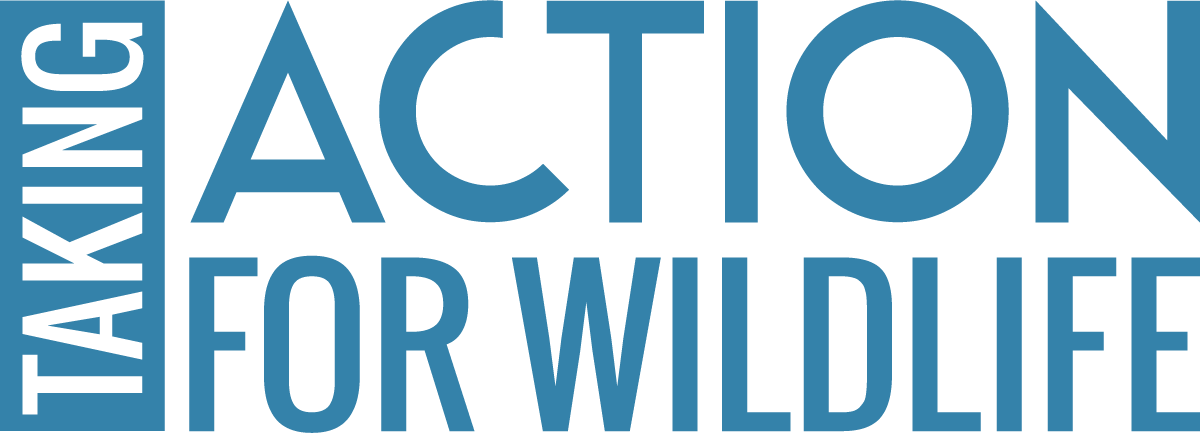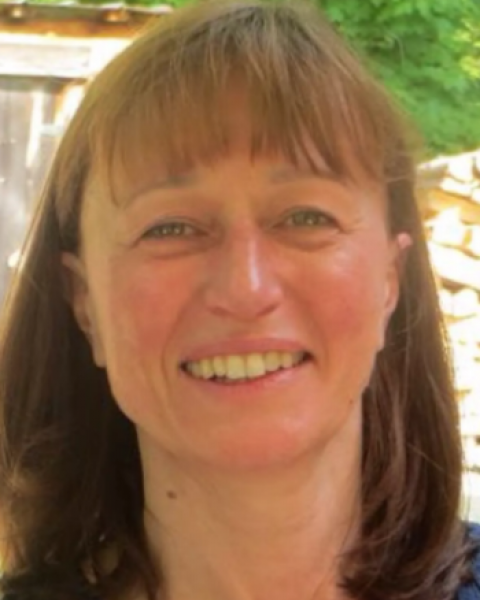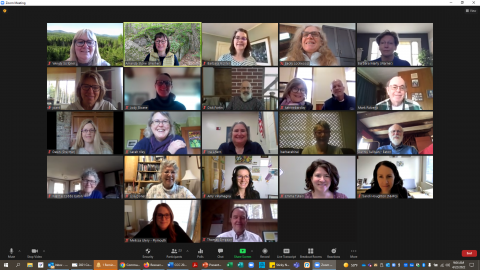
Earth Day April 22, 2022 was an appropriate time for the 2021 Cohort participants to reconvene for their final session to present the results of their on-the-ground projects. They tackled a variety of topics including: Designating a town forest, Developing a trails scorecard, Completing the wildlife section of an NRI, Creating an outdoor classroom, Finding a shared vision for town lands, and Vernal pools inventory, outreach and education.
|
After completing fall 2021 training, the 23 participants in the second annual Community Conservation Cohort rolled up their sleeves and got to work on projects to protect and manage wildlife and habitats and other natural resources. Each community group had a TAFW team advisor helping to guide their projects over the course of the winter and spring. Read on to learn about their amazing accomplishments:
Finding common ground to develop a shared vision for town lands was the focus for the Eaton Cohort group, which included the Conservation Commission, Planning Board and the Select Board. To raise awareness in town about Eaton’s town-owned lands, Cohort members put together a presentation to the townspeople that included the history and management of town lands; as well as the ongoing effects of climate change, increased population, and increased visitor use on wildlife in the community. Each cohort member prepared a draft of their section of the presentation with accompanying slides and text, then members worked together to refine the combined presentation. This process of presenting and refining the sections helped the group develop an engaging program titled, “Finding a Shared Vision for Eaton Town Lands”. The program was offered twice in February, on a Thursday evening and on a Saturday morning to make it easier for people to participate. In addition, people could choose to participate in-person or via Zoom.
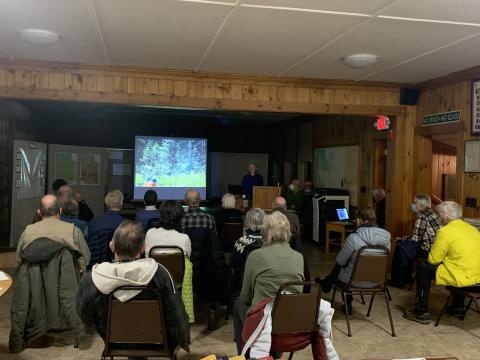
The response from the workshop participants was very appreciative, making it possible to begin a real conversation. In response to the information session, one participant wrote, “I was blown away by the work the Conservation Commission has accomplished over the years and feel much more fully informed about all the natural treasures in our town. Your presentation was extremely informative.” As the Cohort group immersed themselves in this process, they realized that developing a Conservation Plan for the town is their next logical step. They plan to start that work in the spring and involve more townspeople who have offered to help the community effort move forward.
|
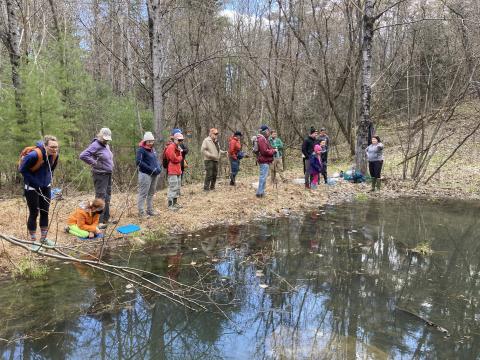
Vernal pools are a priority – and not just for amphibians! The Lebanon Cohort group set out with the goal to increase the public awareness of vernal pools in town and engage townspeople in monitoring and protecting these important habitats. They also hope to improve protections for vernal pools and places where amphibians cross roads during spring migrations. In their work to increase public awareness around vernal pools, they developed a community outreach calendar. They gathered vernal pool resources to share with the community through their email list and town social media and mapped out the timeline for when to share those resources throughout the spring. They hope to expand this community outreach calendar to include other conservation topics to share with the public throughout the year. They also engaged with their local library to create a display promoting vernal pool resources and educational materials. Their work with the cohort will culminate in a vernal pool workshop to be held in late April 2022. The 2-part workshop includes a family-friendly intro to vernal pools, followed by a more in-depth look at how to document vernal pools. The workshop will help to recruit a core of volunteers interested in documenting and monitoring vernal pools in Lebanon to help carry this work forward into the future!
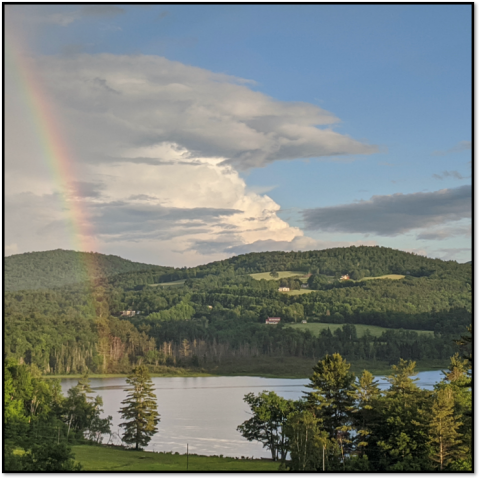
Pearl Lake is a real gem! The Lisbon Conservation Commission got to work on a project to designate the town-owned Pearl Lake property as a town forest, which required a vote at town meeting. To accomplish this, the cohort group drafted a warrant article and worked closely with the select board to gain their support for the project. The proposal to the select board recommended that the site be used as a public forest and conservation land surrounding Lake Pearl. The project involved advocating for the town forest through meetings with town boards and educating the public. The Cohort team presented an informational program to the public to explain the goals of the conservation and the benefits of a town forest. They outlined the importance of protecting this area as productive forest through sustainable management and assured the public that the property would be maintained as a scenic resource, would ensure safe water recreation activities like fishing and swimming, and would protect the critical wildlife habitat surrounding Pearl Lake for a variety of wildlife, such as the bald eagle, osprey, loon, otter, hare, black bear, moose, perch, bass, trout and a variety of reptiles and amphibians. They also wrote an article in support of creating a town forest in the Lisbon Newsletter. The article focused on the benefits of a town forest to the community and outlined the potential threats from development of the area. “with increased pressure on natural resources this is an ideal time for Lisbon to protect this “Pearl” for all to enjoy.” At the 2022 Lisbon Town Meeting, the voters passed article # 09 and approved the designation the Lisbon Town Forest and authorized the conservation commission to manage the land.
Can you tackle both a natural resources inventory and a trails assessment – the answer is Yes! The Plymouth Cohort group had big ideas and decided to advance two projects. Their 2005 Natural Resources Inventory (NRI) was out of date. Recognizing that tackling an updated 2022 NRI all at once was a big undertaking, they decided to focus on the Wildlife section first, gathering relevant wildlife and habitats data, and preparing maps, data, and other resources to make this information available to the Conservation Commission and the public via a written document. They also had a concern around public trails and their impacts on wildlife, so their second goal was to develop a trails assessment framework and scorecard that reflects the five principles described in the Trails for People and Wildlife report as well as three additional locally important parameters: erosion, cultural resources, litter. They plan to use the scorecard to review and manage both existing trails and inform new trail planning. So, how did they get these two projects done? The Cohort was fortunate to include staff at Plymouth State University and Plymouth Regional High School who were able to tackle these two complementary projects by engaging their students, as well as a GIS expert who was able to provide this technical expertise. The commitment and enthusiasm of the two groups of students exceeded expectations and resulted in successfully reaching the goals of both projects, while demonstrating the power of community engagement and collaboration, and engaging the next generation of stewards. Other NH communities can consider the benefits of engaging with students at local colleges to assist with their conservation work.
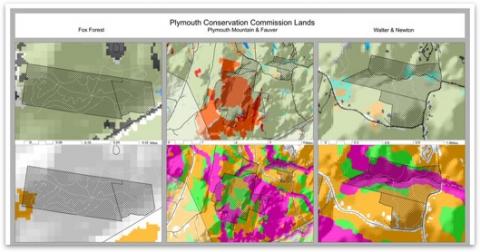
|
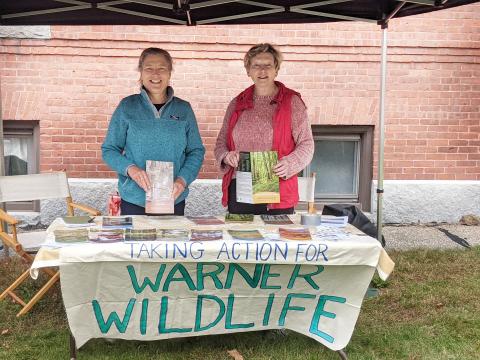
Pollinators, trails and more! When the Warner cohort group was looking for a place to raise public awareness about the important of pollinators and healthy forests in their town, one property came to mind immediately. The Chandler Reservation is a 1,500-acre hidden gem in the town of Warner – a place that has been well-managed over the years, but gets little use by town residents. The cohort set out to revitalize interest in this special place through a couple of projects – establishing pollinator habitat in the field area and creating an educational nature trail in the forest. They’re well on their way to creating a pollinator habitat demonstration area for the town at Chandler, with plans to plant a small garden of native plants and shrubs this fall and start site preparations for an area that will be seeded with native wildflower seeds later this year. They’ve developed content for signs along the educational nature loop trail that will cover a variety of topics including wildlife habitats, forest management, and land use history. While working on these longer-term projects, they also planned and implemented their first successful community engagement event on the property. “Chill Out at Chandler” was held in February 2021 and involved more than 50 community members in a variety of winter activities like winter tree and shrub identification, a scavenger hunt for kids, sledding, and smores by the fire. For many participants, it was their first visit to the property – but it won’t be their last! The cohort group is in the process of planning for another community event to help plant the pollinator garden in the spring.

